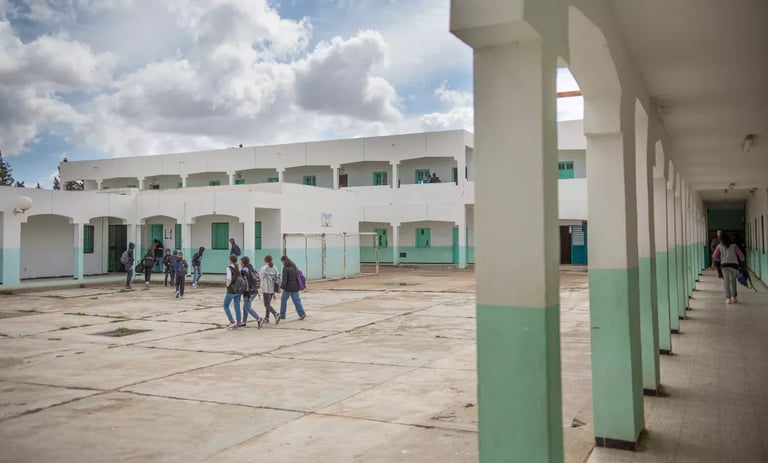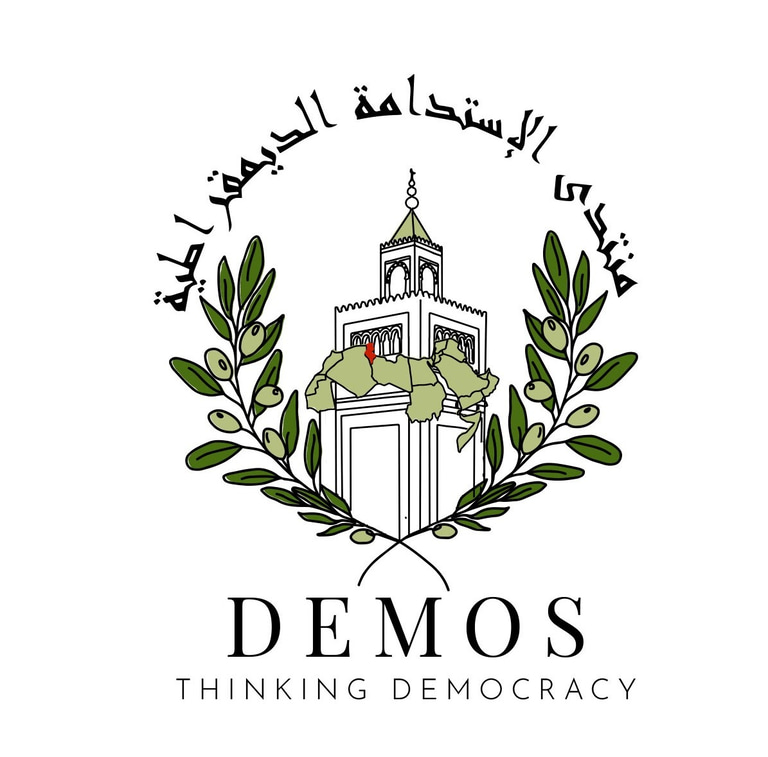When the Walls of Education Collapse
By Ayet Bouhajeb
August 25, 2025


In April 2025, a school wall in Mezzouna, Sidi Bouzid collapsed, killing three students and injuring others. The tragedy sparked public outrage and official visits, including one by President Kais Saied, briefly reviving calls to fix Tunisia’s broken education system. But as with past crises, momentum quickly faded. The collapse was not just a failure of infrastructure, it exposed a deeper civic breakdown, where the state’s inability to protect and empower its youth reflects its wider neglect of democratic renewal.
While debates about education in Tunisia often focus on physical infrastructure, regional inequality, or employment gaps, a more fundamental question has long been neglected: what kind of citizen is Tunisia’s education system producing? Over a decade after its democratic revolution, Tunisia has yet to develop an education system that fosters critical thinking, civic engagement, or democratic participation. Nowhere is this clearer than in the country’s ongoing failure to reform its curricula and reimagine education as a democratic project.
This failure is not just a pedagogical issue. It is a political one. In the absence of a national project, Tunisia’s transition remains fragile. Education reform is essential for democratic sustainability because it shapes the citizens who will defend or dismantle democracy in the years to come.
In the aftermath of the 2011 revolution, Tunisians were promised a new social contract rooted in dignity, freedom, and democratic governance. Education was positioned as central to that vision. Article 39 of the 2014 constitution declared that education “shall consolidate the Arab-Muslim identity, national belonging, and the culture of human rights,” while committing the state to establish a Higher Council for Education (المجلس اﻷعلى للتربية والتعليم) to guide systemic reform.
That constitutional commitment was followed by the publication of the White Book on Education Reform in 2016, a landmark document authored by the Ministry of Education after national consultations. The White Book recognized education as a “strategic lever for societal transformation,” calling explicitly for a democratic, inclusive, and student-centered system. It outlined ambitions to overhaul curricula, decentralize school governance, invest in teacher training, and position civic and moral education as a pillar of national development.
Yet nearly a decade later, those ambitions remain largely unrealized. The Higher Council has not been formed. Curricular reform has stalled. As one Arab Reform Initiative report notes, reform proposals often “serve to absorb public anger rather than address the roots of dysfunction.” That dysfunction includes a school system increasingly disconnected from the needs of a democracy in crisis, and from the vision laid out in its own White Book.
The Democratic Function of Education
The relationship between education and democratic sustainability is well-documented in political theory, sociology, and civic education studies. For over a century, scholars from John Dewey to Paulo Freire have emphasized that democratic societies require educational systems that do more than produce workers, they must cultivate citizens. Democratic resilience depends not only on electoral systems or constitutional design but on the civic habits, critical reasoning skills, and participatory capacities of ordinary people.
In transitional democracies like Tunisia, this connection is even more urgent. The process of political socialization (the way individuals learn the norms, values, and practices of civic life) often begins in school. Civic education, therefore, is not a peripheral subject but a core democratic institution in its own right. Yet in Tunisia’s case, the civic education curriculum has remained largely stagnant since before the 2011 revolution. Students are taught to identify the structures of government and memorize articles of law, but they are not encouraged to critically examine these structures or reflect on their role in shaping public life.
A striking example is the continued use of the civic education course (تربية مدنية) in schools. Despite the revolution, the course content remains virtually identical to its pre-2011 version: formulaic, shallow, and apolitical. The course emphasizes legal definitions over democratic deliberation, and institutional form over civic function. It offers little opportunity for students to explore the values of pluralism, dissent, or public accountability that are vital to sustaining democracy.
But the problem is broader than one course. As comparative policy research shows, post-authoritarian transitions frequently inherit education systems shaped by the old regime’s logic of obedience and control. Unless intentionally reimagined, these systems reproduce the very hierarchies and exclusions that revolutions seek to dismantle. In Tunisia’s case, the legacy of authoritarian pedagogy persists in classroom culture, textbook content, and educational priorities. In fact, Tunisia’s current civic education model reflects an underlying fear of politics in the classroom. Rather than equipping students to debate ideas, challenge injustices, or participate in civic action, the curriculum emphasizes compliance, order, and a passive understanding of citizenship. It treats the citizen as an object of governance rather than a subject of democratic agency.
Of course, Tunisia’s educational challenges are not only about curriculum. Chronic underfunding, bureaucratic fragmentation, and regional inequalities continue to undermine the sector. Many schools, particularly in interior and southern regions, lack basic amenities such as running water, safe infrastructure, or adequate teacher-student ratios. These material deprivations threaten the health, dignity, and safety of Tunisia’s children and deepen geographic inequalities.
The country is also grappling with alarming rates of school dropouts and student illiteracy. According to public officials, over 100,000 students leave the school system each year, contributing to a rise in functional illiteracy and social marginalization. These indicators reflect a broader erosion of trust in public education.
Yet it is important to emphasize that civic education reform is not primarily a question of funding. Unlike physical infrastructure, revising a curriculum or reimagining the civic purpose of education requires political will more than financial investment. This is what makes the ongoing neglect of civic education particularly concerning: it is a missed opportunity that cannot be blamed solely on scarce resources.
Education as a Democratic Project
If Tunisia’s democratic future is to be safeguarded, education must be reimagined as a civic space, not just a pathway to employment. Reform begins with redefining its purpose: nurturing critical thinkers who can engage constructively in public life. Curricula must embed democratic values and inquiry across disciplines. Teachers should be empowered as facilitators of dialogue, and student unions and school clubs revived as spaces of civic participation. Most importantly, decision-making must be decentralized to involve students, parents, and educators alike.
Central to this vision is the establishment of the long-promised Higher Council for Education and Teaching, an institution enshrined in both the 2014 and 2022 constitutions but still absent. The goals outlined in the Ministry of Education’s 2016 White Book must be revisited not as a historical footnote, but as an unfinished blueprint for Tunisia’s democratic renewal. Otherwise, the walls, both literal and metaphorical, will continue to collapse.
Ayet Bouhajeb is a Fellow at Demos Tunisia. She is an honors graduate from Georgetown University's School of Foreign Service, where she majored in International Politics. Her studies specialized in democratization studies with a focus on the Middle East and North Africa (MENA) region. Ayet's thesis, "Paving the Way for Authoritarianism: Rethinking Tunisia's Democratic Transition Post the Arab Spring (2011-2019)," examined political transitions in the wake of the Arab Spring. Her academic background combines regional expertise with analytical skills in political science and international relations. Currently, Ayet serves as an Associate Consultant at PwC Middle East, where she applies her knowledge of regional dynamics to the firm's consulting projects with the government and public sector.
